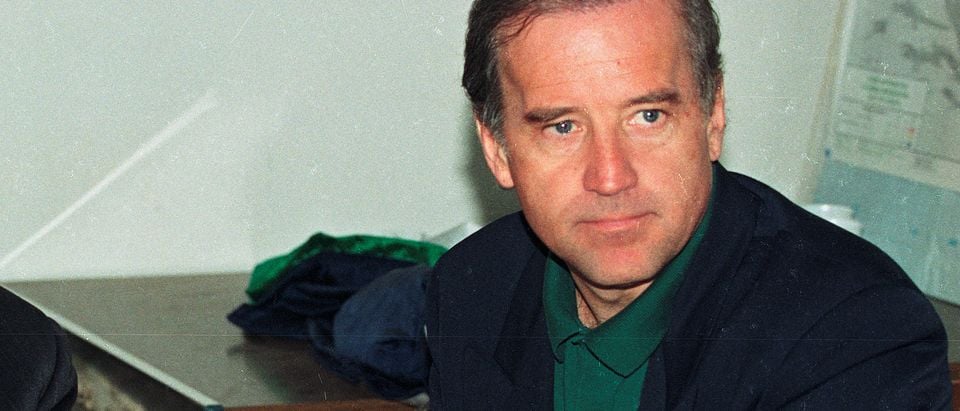- In a recently surfaced video from 1977, Joe Biden explains his stance on desegregation busing, saying such a policy would “set the civil rights movement in America further back.”
- Kamala Harris criticized Biden’s position on the measure during the second night of primary Democratic debates Thursday.
- The Democratic presidential frontrunner’s stance on the subject in 2019 does not appear to differ much from his thoughts in the ’70s.
2020 presidential candidate Joe Biden once said during a press conference that desegregation busing would set the U.S. civil rights Movement back.
In a video from June 28, 1977, shared Friday by ABC News, the then-Delaware Democratic senator told members of the media that the concept of busing would “set the civil rights movement in America further back.”
Busing was a highly controversial topic in the ’70s that aimed to bus students from white neighborhoods to attend majority black schools and students from black neighborhoods to attend majority white schools.
At a presser on June 28, 1977, then-Sen. Joe Biden, explaining his views on busing, said it was harmful to the U.S. civil rights movement.
Biden’s past views on busing have drawn new attention after last night’s heated exchange with Sen. Kamala Harris. https://t.co/i9U3e4M5JZ pic.twitter.com/WxZ86wEsG4
— ABC News (@ABC) June 28, 2019
In the video, Biden explains his opposition to the policy as rural-versus-urban rather than North-versus-South: “We keep talking about [busing] as if it’s an issue of North versus South. That’s not the issue. It’s rural versus urban, and most of the busing … today has taken place in rural areas, whether it’s administratively ordered or court ordered.”
“Now, we’re moving into applying the same standards to urban areas, and it is a standard that doesn’t make sense. It doesn’t apply,” he continued. “… In urban areas, we’ve had integrated areas but segregated neighborhoods. In rural areas, we’ve had integrated neighborhoods but segregated facilities.”
A reporter then says, “No matter what your intent, there are going to be those who say [busing] is a segregated thing, it’s a question of race and that you have set back the movement of desegregation of schools. How would you answer that?” (RELATED: John Lewis Defends Biden Amid Segregation Controversy)
“I predict that the young, black leadership of America will overwhelmingly decide with me,” Biden responded. “I predict that in 1980 and 84, my position will be totally vindicated by the sociologists and the civil rights activists.”
“You know, I come from that side of the track,” he continued, smiling. “That’s where I’m from. I was a defense lawyer. I handled civil rights cases. … I’m not from the other side of this. And I happen to think that the one way to be sure you set the civil rights movement in America further back is to continue to push busing.”
Biden’s words from 42 years ago echoed comments he made during MSNBC’s second night of 2020 Democratic presidential debates Thursday when he told California Sen. Kamala Harris, who criticized his opposition to busing, saying, “You know, there was a little girl in California who was part of the second class to integrate her public schools, and she was bused to school every day. And that little girl was me.”
There was a little girl in California who was bussed to school. That little girl was me. #DemDebate pic.twitter.com/XKm2xP1MDH
— Kamala Harris (@KamalaHarris) June 28, 2019
Biden eventually responded, “In terms of busing … you would have been able to go to school the same exact way because it was a local decision made by your city council. That’s fine. That’s one of the things I argued for, that … we should be breaking down these lines.
“I was a public defender,” Biden continued during the debates. “I didn’t become a prosecutor. I came out and I left a good law firm to become a public defender, when, in fact — when, in fact, my city was in flames because of the assassination of Dr. King.” (RELATED: Kamala Harris Selling ‘That Little Girl Was Me’ T-Shirts)
In 1975, Biden expressed support for an anti-busing measure from segregationist Sen. Jesse Helms. In 1976, Biden voted to stop the DOJ from implementing busing policy in an effort to desegregate public schools, as he explained to Harris during the debate Thursday. And in 1977, he introduced another bill that year opposing court-ordered busing.
A series of 1977 letters from Biden obtained by CNN in April reveals the former senator’s strong opposition to “unnecessary” busing as a way for the federal courts to disrupt the U.S. educational system.
“My bill strikes at the heart of the injustice of court-ordered busing,” he wrote. “It prohibits the federal courts from disrupting our educational system in the name of the Constitution, where there is no evidence that the governmental officials intended to discriminate. I believe there is a growing sentiment in the Congress to curb unnecessary busing.”


